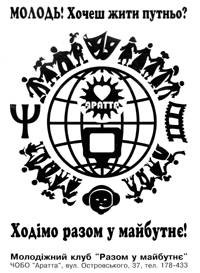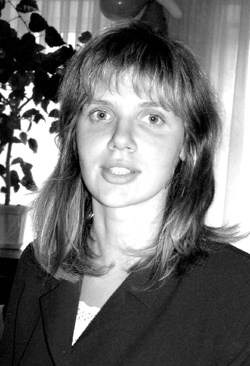With “Aratta” together to the future
 Chernihiv
Region Charity “Aratta” has just started the realization of its new
project “Together to the future”.
Chernihiv
Region Charity “Aratta” has just started the realization of its new
project “Together to the future”.
We found out about the goals and tasks of the project from its leader
Tetyana Marinashenko.

— Tetyana, why did the idea of creation of a new project come from?
— Ukraine is a young state. The history of Ukraine is
only 13 years old. Over these years Ukraine has step by step assimilated
and learnt from the world how to provide children’s social rights.
Ukraine was one of the first countries to ratify the UN convention on
children’s rights.
It is only natural that in first place it is the family who should care
about children’s rights and in second place society. It is unfortunate
that recently the standard of living has dropped for most people in
Ukraine. People’s lives have become unstable and the reason for this is
the economic situation. There are many families in Ukraine who are not
fully able to bring up children or give them an education because of
economic reasons.
In Ukraine there are 1421.6 thousand children from families of low-income
and families with a lot of children.
There are also risk categories families, the families in which children
do not have enough attention (families with one parent, families in
which parents are away earning money, families in which parents are drug
addicts or alcoholics and so on). According to the Fund ASPERN
investigations, the majority of children, who happened to live in the
street, are from families of drug addicts, alcoholics and those who are
desperately poor and unemployed.
The Ukrainian Ministry of Family and Youth Affairs conducts social care
of such families. There are 49.0 thousand families in care in Ukraine in
total, and in Chernihiv, according to the information of Town Department
of Family and Youth Affairs, there are only 369 such families. Such a
low figure doesn’t give a true picture of the problem and in fact says
more about the lack of attention paid to it.
A child devoid of parents’ attention, looks for compensation in the
other surrounding, unfortunately, most often it is the street with all
its consequences – homelessness, juvenile delinquency, shoplifting.
Over the last ten years this problem has become significantly worse in
our country. On the one hand there has been a massive increase of
juvenile delinquency and homelessness but on the other the state and
society are not prepared to take the necessary steps to find solutions
to prevent it. Most often children become criminals because of
inattentive attitude to their problem, because of heartlessness of
people who are near to them.
In Chernihiv town only by official statistics 599 children live in unfit
families: 266 out of them are orphans, the number of children who live
with only one parent is several times greater. The number of low-income
families is more then one thousand.
In 2003 655 teenagers were registered by the police as being juvenile
criminals.
782 crimes were perpetrated by or with the participation of teenagers.
Out of number of people who were suspected in perpetrating a crime
(96.2% had been called to criminal account) 9.6% are teenagers.
Naturally, it is impossible to solve all problems at once. From our
point of view, negative attitude and behaviour is at the root of solving
their delinquency and getting them off the streets. In our view the best
way of doing this is to make sure that a child is kept busy.
However, the reality in Chernihiv is very different, and nowhere is this
more apparent than in schools. Schools haven’t fulfilled their proper
function for a long time. Schools focus their attention on education,
adding extra subjects, except for the occasional outing during the
holidays and organising a disco, there are no other extracurricular
activities.
That is the reason we decided to develop this project.
— Tell please about the work of the youth club “Together to the
Future”.
— In the context of this project Youth club “Together to the
Future” started it’s work in “Aratta”, it provides work of number of
programs. Among them “Adapt” programme, which is rich with different
activities (visiting cultural mass actions, and joint work of children
through conducting survey among teenagers, and watching video-films from
the thesaurus of world cinematograph to form mature world outlook and
tastes of children), “Your Future Professional Choice”, “Computer
Competence”, “Spoken English” and others.
The goal of the club is to make sure children spend their time safely
and to broaden their knowledge and learn new skills. We consider Club
for teenagers to be a unique, distinctive and effective mechanism of
children’s rights protection and socialisation of children. The Club
first of all is a Centre of communication, useful leisure and positive
information. It will provide primary social help in solving urgent
problems, will influence a child’s future decisions. In the club a child
can feel free and try different kinds of activities.
— What category of children is the project expected to deal with?
Roughly 50 teenagers of 13-18 from risk groups (orphans, children from
unfit families, from low-income families, from families with only one
parent, and families with a lot of children, by recommendation of family
and youth Department, teenagers affairs service, centre of social
services, schools of town)
— Will you get other state and public organization to co-operate with
you?
Chernihiv Regional Charity “Aratta” is experiencing new period of it’s
history –and is becoming more and more active. We are acknowledged as a
serious public organisation, thanks to the participation of state and
local social programmes designed to support those members of society who
can’t look after themselves. Training sessions, round table discussions,
seminars, international cooperation have all helped in our
acknowledgement. We are followed and trusted and more and more people
are showing an interest in our work. To date we had sent appeal-letters
out to all heads of schools and public organizations with the proposal
to co-operate. We believe no-one has the right to be indifferent to
childhood.
— Thank you for the interview. Good luck in
everything you do.
